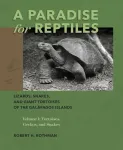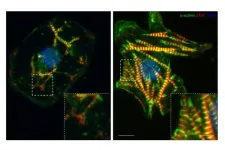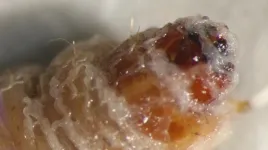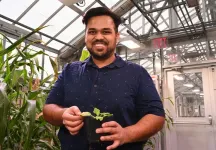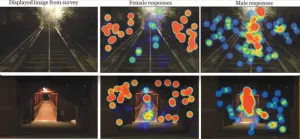(Press-News.org) Natural scientist and author Robert Rothman takes readers on a reptillian tour of the Galápagos Islands in his new book, A Paradise for Reptiles: Lizards, Snakes, and Giant Tortoises of the Galápagos Islands Vol. 1: Tortoises, Geckos, and Snakes, published by RIT Press.
For more than 30 years, Rothman has led hundreds of Rochester Institute of Technology students on tours to the Galápagos Islands to observe the wildlife and landscape that inspired Charles Darwin’s theory of evolution by natural selection. Rothman’s A Paradise for Reptiles, an homage to the 19th century scientist, is an accessibly written guide for anyone interested in Darwin, the Galápagos, and reptiles in general.
“It’s the only real synthesis of research that’s been done on those reptiles,” said Rothman, RIT emeritus professor, whose photography illustrates the book. “What I’ve tried to do is, while being scientifically rigorous, make it accessible to anyone who is interested in the Galápagos.”
The story of Galápagos reptiles is tied to the unique geography of the archipelago, and Rothman’s account begins with the geologic processes that formed the chain of volcanic islands. Plants and wildlife reached the islands from South America, adapted to the different habitats, and evolved independently.
An understanding of the habitat leads to a comprehensive review of the giant tortoise, the beloved ambassador of the Galápagos. At one time 18 different types of Galápagos tortoises lived on the islands. That number has dropped, and scientists have used recent DNA analysis to discover hybrid tortoises related to two extinct species.
Buccaneers, mariners, and scientists over hunted giant tortoises for centuries. Now, conservation and repatriation efforts are trying to preserve them, Rothman said. Lonesome George, the last Pinta Island tortoise, held celebrity status at the Charles Darwin Research Station and became a mascot shared by the Galápagos National Park Directorate. Efforts to breed Lonesome George were unsuccessful and the species disappeared with his death in 2012.
“Lonesome George was the symbol of the extreme fragility of the Galápagos Islands and a reminder of the need for vigilance and conservation,” Rothman said. “He is an icon for the finality of extinction.”
A Paradise for Reptiles also includes two shorter sections discussing Galápagos geckos and racer snakes. The Galápagos geckos’ nocturnal existence contributes to their large absence from the scientific literature, Rothman said. Darwin collected related gecko specimens while visiting nearby Patagonia, but none from the archipelago.
Visitors today rarely see Galápagos geckos because their nocturnal activity conflicts with tourist hours on the islands. Tourists must leave the island by 6 p.m., Rothman said. People staying in hotels on the major islands typically see a different type of gecko.
“The geckos come out in force in the evening, but it is the introduced species that are generally seen,” Rothman said.
Rothman concludes his book with findings from the few research studies about the elusive racer snakes. Although Darwin returned from the Galápagos with snake specimens, these reptiles remain obscure.
“Snakes are the least studied and least understood reptile in the Galápagos,” Rothman said.
The archipelago encapsulates Rothman’s lifelong interest in vertebrate paleontology, evolution, and the history of science, as well as Darwin’s discoveries. As an RIT professor of biology and genetics, he taught one of the university’s longest running study abroad programs to the Galápagos Islands.
“When you visit a place once, the way you see it is the way you think it is,” Rothman writes. “However, by returning so many times, I have seen the Galápagos in its many moods.”
To purchase a copy of A Paradise for Reptiles: Lizards, Snakes, and Giant Tortoises of the Galápagos Islands Vol. 1: Tortoises, Geckos, and Snakes, contact RIT Press.
Rothman’s second volume on Galápagos reptiles will publish later this year with a focus on marine and land iguanas and lava lizards.
END
The Galapagos comes to life in new RIT Press book
Author Robert Rothman visited the archipelago more than 30 times
2024-02-08
ELSE PRESS RELEASES FROM THIS DATE:
Social media can reveal who needs the most help
2024-02-08
Language use in social media can be a useful tool for social scientists, because it reflects living conditions in areas the posts originate from.
“There is a correlation between social inequalities and language patterns in social media,” says Associate Professor Lucas M. Bietti at the Norwegian University of Science and Technology (NTNU’s) Department of Psychology.
Researchers studied 30 million X/Twitter posts from the United States. They compared the language used in the tweets to the living conditions in the counties from which the ...
Clues to cancer drug’s deadly side effects could make it safer
2024-02-08
For some leukemia patients, the only potential chemotherapy option is a drug that also carries a high risk of heart failure. This means that some patients who recover from their cancer will end up dying of heart disease brought on by the cure.
In a new study, researchers from the University of Illinois Chicago and other universities have identified mechanisms that cause the drug, ponatinib, to harm the heart. They also identified a promising treatment that could reverse this process. The paper, with senior author Sang Ging Ong, assistant professor of pharmacology and medicine at UIC, is published in Circulation Research. The study is part of a growing field called cardio-oncology ...
Surprise discovery of tiny insect-killing worm
2024-02-08
UC Riverside scientists have discovered a tiny worm species that infects and kills insects. These worms, called nematodes, could control crop pests in warm, humid places where other beneficial nematodes are currently unable to thrive.
This new species is a member of a family of nematodes called Steinernema that have long been used in agriculture to control insect parasites without pesticides. Steinernema are not harmful to humans or other mammals and were first discovered in the 1920s.
“We spray trillions of them on crops every year, and they’re ...
Are environmental toxins putting future generations at risk?
2024-02-08
In a study that signals potential reproductive and health complications in humans, now and for future generations, researchers from McGill University, the University of Pretoria, Université Laval, Aarhus University, and the University of Copenhagen, have concluded that fathers exposed to environmental toxins, notably DDT, may produce sperm with health consequences for their children.
The decade-long research project examined the impact of DDT on the sperm epigenome of South African Vhavenda and Greenlandic ...
Protecting the protector boosts plant oil content
2024-02-08
UPTON, NY—Biologists at the U.S. Department of Energy’s (DOE) Brookhaven National Laboratory have demonstrated a new way to boost the oil content of plant leaves and seeds. As described in the journal New Phytologist, the scientists identified and successfully altered key portions of a protein that protects newly synthesized oil droplets. The genetic alterations essentially protect the oil-protector protein so more oil can accumulate.
“Implementing this strategy in bioenergy or oil crop plants could ...
Physical activity is insufficient to counter cardiovascular risk associated with sugar-sweetened beverage consumption
2024-02-08
Québec, February 8, 2024 - Contrary to popular belief, the benefits of physical activity do not outweigh the risks of cardiovascular disease associated with drinking sugar-sweetened beverages, according to a new study led by Harvard T. H. Chan School of Public Health. Jean-Philippe Drouin-Chartier, professor at Université Laval’s Faculty of Pharmacy, was a co-author.
Sugar-sweetened beverages are the largest source of added sugars in the North American diet. Their consumption is associated with ...
CARB-X funds Visby Medical to develop a portable rapid diagnostic for gonorrhea including antibiotic susceptibility
2024-02-08
(BOSTON: Thursday, February 8, 2024) – Combating Antibiotic-Resistant Bacteria Biopharmaceutical Accelerator (CARB-X) will award up to US$1.8 million to biotechnology company, Visby Medical, to develop a portable rapid polymerase chain reaction (PCR) diagnostic to detect the presence of the pathogen that causes gonorrhea, Neisseria gonorrhoeae (NG), and its susceptibility to ciprofloxacin, a former frontline oral antibiotic that can no longer treat resistant NG. A rapid result on when ciprofloxacin may be effective could enable physicians to treat gonorrhea patients with confidence, while reserving ceftriaxone, the only antibiotic that remains effective against resistant NG.
Visby ...
Fusion research facility JET’s final tritium experiments yield new energy record
2024-02-08
GARCHING and OXFORD (8 February 2024) –
The Joint European Torus (JET), one of the world’s largest and most powerful fusion machines, has demonstrated the ability to reliably generate fusion energy, whilst simultaneously setting a world-record in energy output.
These notable accomplishments represent a significant milestone in the field of fusion science and engineering.
In JET's final deuterium-tritium experiments (DTE3), high fusion power was consistently produced for 5 seconds, resulting in a ground-breaking record of 69 megajoules using a mere 0.2 milligrams of fuel.
JET is a tokamak, a design which uses powerful ...
A new “metal swap” method for creating lateral heterostructures of 2D materials
2024-02-08
Electronically conducting two-dimensional (2D) materials are currently hot topics of research in both physics and chemistry owing to their unique properties that have the potential to open up new avenues in science and technology. Moreover, the combination of different 2D materials, called heterostructures, expands the diversity of their electrical, photochemical, and magnetic properties. This can lead to innovative electronic devices not achievable with a single material alone.
Heterostructures can be fabricated in two ways: vertically, with materials ...
Study visually captures a hard truth: Walking home at night is not the same for women
2024-02-08
An eye-catching new study shows just how different the experience of walking home at night is for women versus men.
The study, led by Brigham Young University public health professor Robbie Chaney, provides clear visual evidence of the constant environmental scanning women conduct as they walk in the dark, a safety consideration the study shows is unique to their experience.
Chaney and co-authors Alyssa Baer and Ida Tovar showed pictures of campus areas at four Utah universities — Utah Valley University, ...
LAST 30 PRESS RELEASES:
Study: Reported crop yield gains from breeding may be overstated
Stem cells from human baby teeth show promise for treating cerebral palsy
Chimps’ love for crystals could help us understand our own ancestors’ fascination with these stones
Vaginal estrogen therapy not linked to cancer recurrence in survivors of endometrial cancer
How estrogen helps protect women from high blood pressure
Breaking the efficiency barrier: Researchers propose multi-stage solar system to harness the full spectrum
A new name, a new beginning: Building a green energy future together
From algorithms to atoms: How artificial intelligence is accelerating the discovery of next-generation energy materials
Loneliness linked to fear of embarrassment: teen research
New MOH–NUS Fellowship launched to strengthen everyday ethics in Singapore’s healthcare sector
Sungkyunkwan University researchers develop next-generation transparent electrode without rare metal indium
What's going on inside quantum computers?: New method simplifies process tomography
This ancient plant-eater had a twisted jaw and sideways-facing teeth
Jackdaw chicks listen to adults to learn about predators
Toxic algal bloom has taken a heavy toll on mental health
Beyond silicon: SKKU team presents Indium Selenide roadmap for ultra-low-power AI and quantum computing
Sugar comforts newborn babies during painful procedures
Pollen exposure linked to poorer exam results taken at the end of secondary school
7 hours 18 mins may be optimal sleep length for avoiding type 2 diabetes precursor
Around 6 deaths a year linked to clubbing in the UK
Children’s development set back years by Covid lockdowns, study reveals
Four decades of data give unique insight into the Sun’s inner life
Urban trees can absorb more CO₂ than cars emit during summer
Fund for Science and Technology awards $15 million to Scripps Oceanography
New NIH grant advances Lupus protein research
New farm-scale biochar system could cut agricultural emissions by 75 percent while removing carbon from the atmosphere
From herbal waste to high performance clean water material: Turning traditional medicine residues into powerful biochar
New sulfur-iron biochar shows powerful ability to lock up arsenic and cadmium in contaminated soils
AI-driven chart review accurately identifies potential rare disease trial participants in new study
Paleontologist Stephen Chester and colleagues reveal new clues about early primate evolution
[Press-News.org] The Galapagos comes to life in new RIT Press bookAuthor Robert Rothman visited the archipelago more than 30 times
